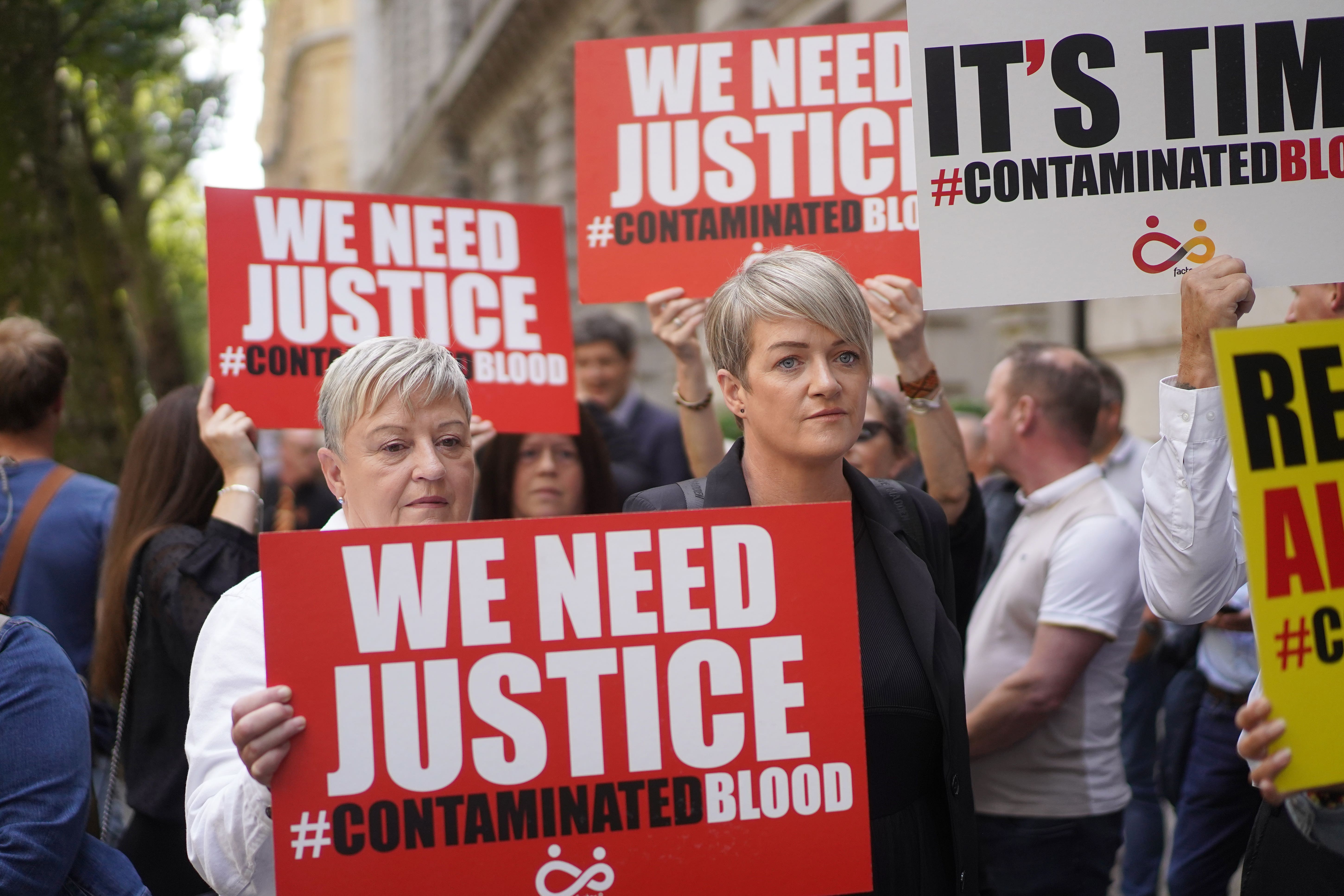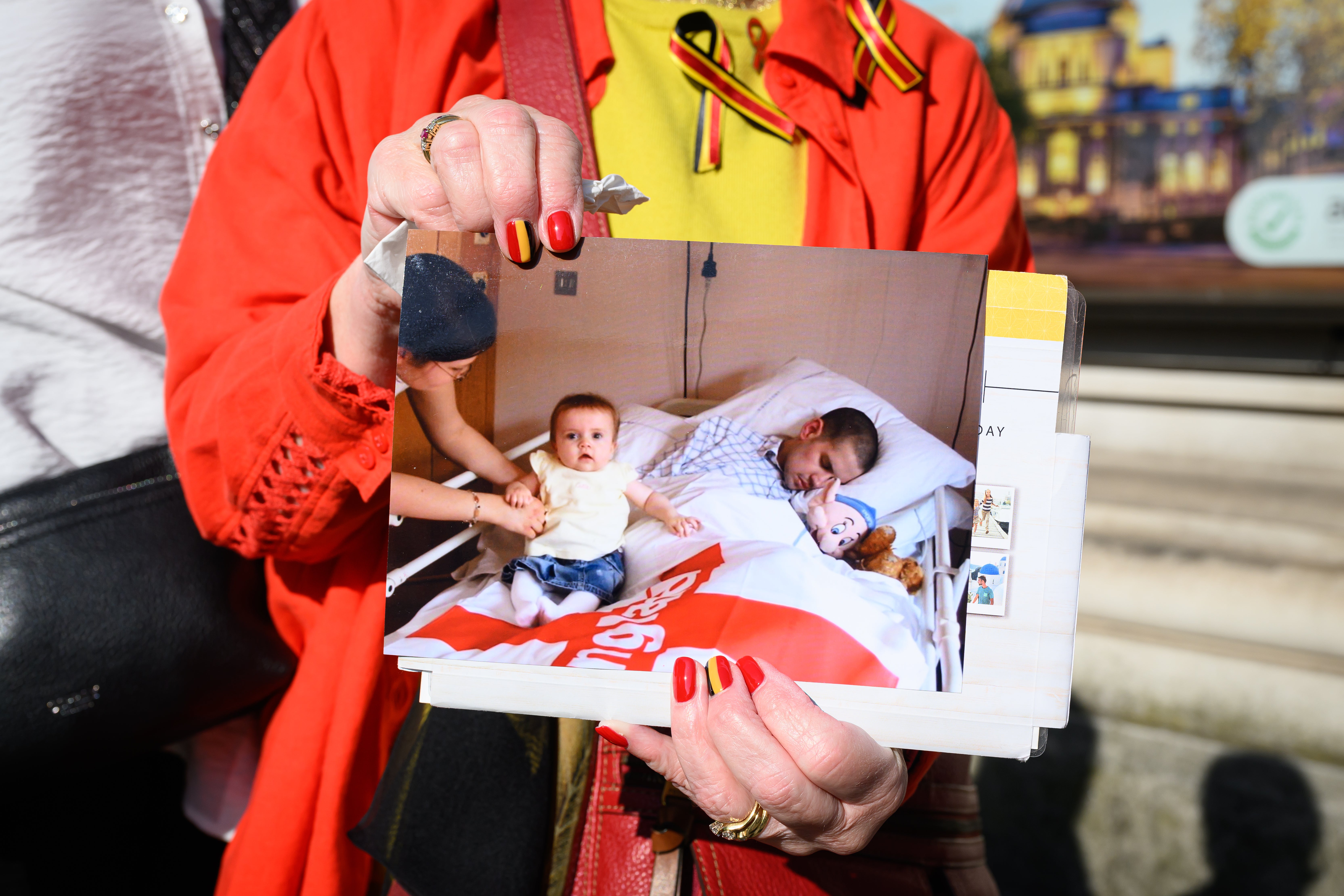Infected blood scandal inquiry: Betrayal, lies and chilling cover-up as Rishi Sunak describes ‘day of shame’
‘Decades-long moral failure at the heart of our national life,’ says prime minister Rishi Sunak
Your support helps us to tell the story
From reproductive rights to climate change to Big Tech, The Independent is on the ground when the story is developing. Whether it's investigating the financials of Elon Musk's pro-Trump PAC or producing our latest documentary, 'The A Word', which shines a light on the American women fighting for reproductive rights, we know how important it is to parse out the facts from the messaging.
At such a critical moment in US history, we need reporters on the ground. Your donation allows us to keep sending journalists to speak to both sides of the story.
The Independent is trusted by Americans across the entire political spectrum. And unlike many other quality news outlets, we choose not to lock Americans out of our reporting and analysis with paywalls. We believe quality journalism should be available to everyone, paid for by those who can afford it.
Your support makes all the difference.After decades of tragic deaths and deceit, a report has exposed a massive cover-up of the biggest healthcare failure in British history, in what Rishi Sunak acknowledged was “a day of shame”.
The final report of the Infected Blood Inquiry, pointed the finger at politicians, doctors and civil servants for a chilling cover-up of a scandal that led to the deaths and suffering that continue to this day.
From the 1970s to the 1990s, a calamity of failures left 30,000 patients infected with HIV and hepatitis, and killed more than 3,000 people so far.
In a new horrifying revelation the inquiry, led by Sir Brian Langstaff, suggested hundreds of people infected during childbirth may still be living undiagnosed and unaware. It has recommended patients who might have had blood transfusions prior to 1996 should be tested for hepatitis C.
In a statement to the Commons, the prime minister issued an unequivocal apology on behalf of the state for decades of failure and betrayal.
Speaking in a hushed chamber on Monday afternoon, Mr Sunak said: “This is a day of shame for the British state.
“Today’s report shows a decades-long moral failure at the heart of our national life. From the National Health Service to the civil service, to ministers in successive governments, at every level the people and institutions in which we place our trust failed in the most harrowing and devastating way.
“They failed the victims and their families and they failed this country.”
He pledged that lessons will be learnt from the report and that Cabinet Office minister John Glen will provide details of compensation for the victims and their families, which is expected to exceed £10bn, on Tuesday morning.
Belfast woman Danielle Mullan was one of thousands of family members awaiting the report. She said it was surreal to read the findings without her mum, Marie Cromie, at her side.
Another victim, Nigel Hamilton from Islandmagee in County Antrim, spoke of the “cascade of emotions” he felt receiving the report less than five months after the death of his twin brother, Simon.
Giving his statement, Mr Sunak told the Commons: “Sir Brian finds a catalogue of systemic, collective and individual failures – each on its own serious, and taken together amounting to a calamity.
“And the result of this inquiry should shake our nation to its core. This should have been avoided. It was known these treatments were contaminated, warnings were ignored repeatedly.
“Time and again people in positions of power and trust had the chance to stop the transmission of those infections. Time and again they failed to do so.”
Dozens of failures by the government and NHS were highlighted in the report. They include:
- Allowing the importation and distribution from 1973 of blood products made in the US and Austria which carried a high risk of causing hepatitis
- Teenage boys being treated “as objects for research” and infected with HIV and hepatitis C through contaminated products
- Deliberate destruction of documents and falsely reassuring the public and patients that blood didn’t carry Aids and that hepatitis C was relatively mild and inconsequential
- Failing to tell people they were infected or delaying telling them, and failing to trace patients once universal hepatitis C screening was introduced
- Repeatedly using inaccurate and defensive language which “cruelly” told people that they had received the best treatment available

The prime minister’s words were echoed by Labour leader Sir Keir Starmer, who issued a full apology on behalf of his own party and said “a harsh light” needs to be shone on the lessons that need to be learnt. Sir Keir added that it was also a failure of politics that justice had taken so long.
Welcoming the prime minister’s statement, he said: “He should be under no doubt whatsoever that we will work with him to get that done swiftly.
“Because ... the victims in this scandal have suffered unspeakably, thousands of people have died, they continue to die every week, lives completely shattered, evidence wilfully destroyed, victims marginalised, people watching their loved ones die, children used as objects of research – on and on it goes.
“The pain is barely conceivable and so, as well as an apology, I also want to make clear we commit that we will shine a harsh light upon the lessons that must be learned to make sure nothing like this ever happens again.”
The long-awaited report, which details decades of officials hiding the truth, said: “Viewing the response of the NHS and government, the answer to the question ‘was there a cover-up?’ is that there has been.
“Not in the sense of a handful of people plotting in an orchestrated conspiracy to mislead, but in a way that was more subtle, more pervasive and more chilling in its implications.”
It warned that most infections could and should have been avoided, revealing that the government knew by 1982 that whatever was causing Aids might be transmissible by blood products, but continued to use them into the 1990s.
Labour MP and home affairs committee chair Dame Diana Johnson was singled out by the prime minister for the work she has carried out pushing for justice.
She told MPs: “Finally the truth! It is a vindication of nearly 50 years of campaigning for justice.”
It was known as early as the 1970s that the virus responsible for hepatitis C was responsible for the majority of post-transfusion infections.
The scandal dates back even further as the inquiry makes clear it was “well known” from at least the early 1940s that blood transfusions or the use of plasma could transmit hepatitis.
Sir Brian said: “In families across the UK, people were treated by the NHS and over 30,000 were given infections which were life-shattering. 3,000 people have already died and that number is climbing week by week. Lives, dreams, friendships, families, finances were destroyed.
“This disaster was not an accident. The infections happened because those in authority – doctors, the blood services and successive governments – did not put patient safety first. The response of those in authority served to compound people’s suffering.
“The government is right to accept that compensation must be paid. Now is the time for national recognition of this disaster and for proper compensation to all who have been wronged.”

It found attempts by officials were made to hide the truth to “save face and save expense” and that the NHS was directly accused of a “defensive closing of ranks”.
Kenneth Clarke, who was minister of state at the Department of Health between 1982 and 1985 and health secretary between 1988 and 1990, was described as “blase” in his response to the inquiry about the collection of blood from prisons in the US as late as 1983.
In September 1983 in the publication of an Aids donor leaflet Lord Clarke said: “It has been suggested that Aids may be transmitted in blood or blood products. There is no conclusive proof that this is so.”
The line was repeated in various forms by other officials, including to the press and in parliament. The inquiry has said while “technically correct” the “no conclusive proof” line was “indefensible” and gave “false reassurance”.
Victims of the contaminated blood scandal have demanded Lord Clarke apologise for his “absolutely appalling” behaviour towards the haemophilia community.

Join our commenting forum
Join thought-provoking conversations, follow other Independent readers and see their replies
Comments